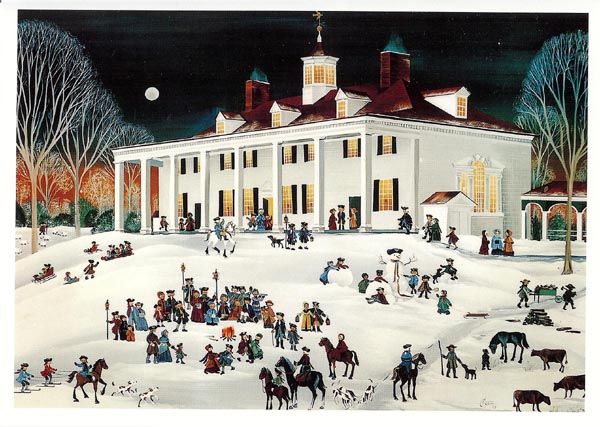 Articles in this section are from the past 6 to 12 months,
Articles in this section are from the past 6 to 12 months,
 Two-hundred-thirty-two years ago this week George Washington was Christmas shopping in New York City, which is not necessarily remarkable. This year thousands of shoppers (even some of you, dear readers) will travel to the Big Apple for the same purpose. Tourists will head straight for Tiffany’s, or the pricier, well-known retailers of Manhattan. The more experienced shoppers will head for Jamaica, Queens to find (so I’m told) great bargains, and unique items. General Washington was in the city waiting to oversee the final removal of British forces from the United States. His plans were to make his way to Annapolis, where he would surrender his commission to congress, and then make his way home to Mount Vernon by Christmas Eve. Because winter travel was slow, and every town on his route planned to fete and celebrate him, his schedule would be tight. Before bidding an emotional farewell to his officer corps at Fraunces Tavern, though, he had items he wanted to pick up, since he was in the city. For His wife he purchased jewelry and a silver tea service. For the grandchildren he purchased games, toys, dolls, and musical instruments.
Two-hundred-thirty-two years ago this week George Washington was Christmas shopping in New York City, which is not necessarily remarkable. This year thousands of shoppers (even some of you, dear readers) will travel to the Big Apple for the same purpose. Tourists will head straight for Tiffany’s, or the pricier, well-known retailers of Manhattan. The more experienced shoppers will head for Jamaica, Queens to find (so I’m told) great bargains, and unique items. General Washington was in the city waiting to oversee the final removal of British forces from the United States. His plans were to make his way to Annapolis, where he would surrender his commission to congress, and then make his way home to Mount Vernon by Christmas Eve. Because winter travel was slow, and every town on his route planned to fete and celebrate him, his schedule would be tight. Before bidding an emotional farewell to his officer corps at Fraunces Tavern, though, he had items he wanted to pick up, since he was in the city. For His wife he purchased jewelry and a silver tea service. For the grandchildren he purchased games, toys, dolls, and musical instruments.
America’s war of independence was full of unbelievable coincidences: the fog rolling in after the defeat of continental forces at the Battle of Brooklyn Heights, allowing the safe retreat of the army; the arrival on the scene of an entire generation of remarkable heroes at just the right time; the deaths of Adams and Jefferson on the same day – July 4, 1826 – the 50th anniversary of the signing of the Declaration of Independence, among myriad others. One of these seemingly providential moments occurred at sunset, December 24th, 1783 when George Washington walked through the door of his own home after an absence of 8 years.
Even a casual reading of the history of this period allows one to understand how they saw the hand of Divine Providence in all this. Then again, any of us who actually pay attention to our past year will surely see the hand of God. Thinking back over our year, remembering our lost loved ones, our new brothers and sisters, the weddings and births we have celebrated – we know He has been here with us, and will be, all the way, every step, until the end of the age.
This is the last Manassas Messenger of the year. Lord willing, we will resume publication again the first week of January 2016. We, the office staff of the Manassas Church of Christ would like to thank you all for another year of serving together in the vineyard of the Lord.
Robert Frost once wrote a poem about a guy who wanted to buy his “Christmas trees.” The man wanted to clear away acres of pines, and pay Frost a meagre $30. Frost writes that he wishes he could send a tree to each of his friends. He sends them the poem instead.
We send to you the three eternal themes of Faith, Hope, and Love. Of course God has already given these gifts. We, however, can give you this from the Word.
We always give thanks to God for all of you and mention you in our prayers, constantly remembering before our God and Father your work of faith, labor of love, and steadfastness of hope in our Lord Jesus Christ. I Thessalonians 1.2-3
Grace and Peace.

 Holly Holm’s defeat of Ronda Rousey in Melbourne, Australia last Sunday for the UFC women’s bantamweight title was the kind of victory I particularly relish. I have been a fan of Rousey. It is hard not to be – she has been so dominant (her fights have averaged less than a minute long). She was considered unbeatable – the most dominant athlete in the world. Before pursuing a career as a UFC fighter, Rousey was an Olympic bronze medalist in Judo. Her fighting style is based upon this training. She is a grappler and brawler. Holm, conversely, is a world champion, undefeated boxer. This was her first UFC fight. She is taller than Rousey. Her wing-span is long even for her height. She boxed Rousey with supreme skill, landing more than thirty scoring punches and kicks before knocking her out half-way through the second round. She figured out how to beat the unbeatable opponent.
Holly Holm’s defeat of Ronda Rousey in Melbourne, Australia last Sunday for the UFC women’s bantamweight title was the kind of victory I particularly relish. I have been a fan of Rousey. It is hard not to be – she has been so dominant (her fights have averaged less than a minute long). She was considered unbeatable – the most dominant athlete in the world. Before pursuing a career as a UFC fighter, Rousey was an Olympic bronze medalist in Judo. Her fighting style is based upon this training. She is a grappler and brawler. Holm, conversely, is a world champion, undefeated boxer. This was her first UFC fight. She is taller than Rousey. Her wing-span is long even for her height. She boxed Rousey with supreme skill, landing more than thirty scoring punches and kicks before knocking her out half-way through the second round. She figured out how to beat the unbeatable opponent.
That’s why I am so excited about Holm’s victory. I always love it when someone figures out how to beat the unbeatable foe. I love for intelligence to triumph over brute force and superior skill. My favorite athletic event ever is The Rumble in the Jungle, Muhammad Ali’s knockout of George Foreman in Kinshasa, back in 1974. I was an Ali fan, and I thought he had no chance against Foreman who had demolished Frazier with an uppercut which lifted him off the floor like he was an inflatable clown. But Ali figured it out. He invented the “rope-a-dope,” letting Foreman, who had never gone past the fourth round, punch himself out. By the eighth round Foreman was so tired he couldn’t even lift his arms and Ali pummeled him into the canvas.
Brute force, superior skill, and intelligence are all possible paths to victory. None guarantee success, for “the race is not to the swift, nor the battle to the strong, nor bread to men of wisdom for time and chance happen to all” (Ecclesiastes 9.11). None of these three strategies are of any use against our adversary, the devil.
We are no match for him. His intelligence is more advanced, his skill superior, and his brute force more brutish. He is “a roaring lion” – an apex predator (I Peter 5.8). There is only one strategy that works against him – resistance.
Be watchful. Your adversary, the devil, prowls around like a roaring lion seeking someone to devour. Resist him, firm in your faith, knowing that the same kinds of suffering are being experienced by your brotherhood throughout the world. I Peter 5.8-10 ESV
We think we can manage him. We think we can stay one step ahead. We think that we can be strong enough on our own. We lie to ourselves. We go places we ought not. We fill our minds with garbage. We take damaging things into our bodies. We indulge pernicious feelings. We think somehow we will deal with it all. We are wrong. There is only one response to make to our enemy – resistance. When we resist he flees.
Resist the devil and he will flee from you. James 4.7.
Our resistance is successful because we are empowered by God. He will not let us go (Romans 8.31-39). He who is with us is greater that he who is with our enemies (II Kings 6.16). Our faith is the victory that overcomes the world (I John 5.4).
Jesus says that if our right eye offends we should gouge it out, and if our right hand offends we should cut it off (Matthew 5.29). Jesus says we should resist, even by drastic means. I wonder what we would do if Jesus had said to remove our tablets and our smart phones instead of our hands and our eyes.
None of our strategies is sufficient. Time and chance happen to all. God’s strategy is sure. Resist the Devil and he will flee.
I planted, Apollos watered, but God gave the increase. I Corinthians 3.6
 The humbling truth of the verse above must not be missed. God gives the increase. The agricultural metaphor Paul uses communicates this perfectly. Human agency is necessary – God has made it so. Someone must plant, cultivate, and tend the seed. Without the agency of God, the seed will not grow. One may as well plant, cultivate, and tend a rock without the agency of God.
The humbling truth of the verse above must not be missed. God gives the increase. The agricultural metaphor Paul uses communicates this perfectly. Human agency is necessary – God has made it so. Someone must plant, cultivate, and tend the seed. Without the agency of God, the seed will not grow. One may as well plant, cultivate, and tend a rock without the agency of God.
Paul is speaking about evangelism and spiritual formation. We would do well to humbly accept this truth. We can neither save not sanctify anyone. Only God can.
We think we can. We think we must. We often think that our responsibility is to change those we love for the better - that if we see flaws we must act to correct them. God never tells me to make you the best “you” you can be. I have the responsibility to love you (John 13.34-35), to serve you (Matthew 7.12), to pray for you (II Corinthians 1.11). But I cannot change you, nor can you change me. Only God can do that – and then only if we yield to Him.
The New Testament word we are circling is “sanctification.” Sanctification is the process of making something pure and holy. It is the process of spiritual maturity and refinement. The New Testament identifies the agents of sanctification as Jesus (Acts 26.18, I Corinthians 1.30), God (I Thessalonians 4.3), The Word (John 17.17), and most frequently the Spirit (Romans 15.16, II Thessalonians 2.13, Hebrews 12.14, I Peter 1.1). Neither you, nor I are ever mentioned as agents of sanctification for each other.
You and I must sanctify Christ as Lord in our hearts (I Peter 3.15). That will occupy a great deal of our time and attention. It is the removal of the log from our own eye so we may help another with the speck in his (Matthew 7.1-5). We must also love, serve and pray for each other. We must “consider how to provoke one another to love and good deeds,” (Hebrews 10.24). But we are never asked to engage in a test of wills, to win a conflict, or to even wage one. We are not God. One person cannot change another person – only God can, and only when we yield to Him.
Belief that we can (that we must) change another person is a form of faithlessness. It demonstrates a lack of trust in God and His word – as if He is not sufficient without our contribution. Belief that we can (that we must) change another person is a form of Hubris – for we assume the mantle of God.
This assumption – that I have to change you, and you have to change me – may come from the best intentions, but it will not be productive. It will lead to disappointment, discouragement, and bad feelings between us.
Let us love each other, serve each other, pray for each other, encourage each other, and when necessary confront each other. But let us remember - only God can give the increase.
 “A professor, a rabbi and a tradesman walk into a….” That sounds like the beginning of a really lame joke. But all three are a description of the apostle Paul. We know from his wide knowledge of Greek and Roman authors (see Acts 17, and Titus 1), and from his expert use of rhetoric (especially before Agrippa in Acts 26) that he had a fine classical education. He could have been a teacher of rhetoric himself had he chosen that path. We know from the autobiographical information he gives us in Colossians 1 and Philippians 3 that he was educated as a rabbi at the finest school in Judaism, the Temple school, and that his mentor was Gamaliel, one of the greatest scholars in the history of Judaism. He was at the top of his class, he tells us, advancing beyond any of his peers. This was his career path of choice, until Jesus informed Paul on the road to Damascus that He had other plans for him.
“A professor, a rabbi and a tradesman walk into a….” That sounds like the beginning of a really lame joke. But all three are a description of the apostle Paul. We know from his wide knowledge of Greek and Roman authors (see Acts 17, and Titus 1), and from his expert use of rhetoric (especially before Agrippa in Acts 26) that he had a fine classical education. He could have been a teacher of rhetoric himself had he chosen that path. We know from the autobiographical information he gives us in Colossians 1 and Philippians 3 that he was educated as a rabbi at the finest school in Judaism, the Temple school, and that his mentor was Gamaliel, one of the greatest scholars in the history of Judaism. He was at the top of his class, he tells us, advancing beyond any of his peers. This was his career path of choice, until Jesus informed Paul on the road to Damascus that He had other plans for him.
He was also given a vocational education. He had a trade. Our English translations call him a “tent-maker” (Acts 18.1-3). He was trained to work in large pieces of leather and cloth, making tents and awnings. He was a tradesman. This training proved fortunate for him, because it brought Priscilla and Aquila into his life, and allowed him to support himself throughout his missionary journeys. Paul was a professor, a rabbi, and a tradesman.
When he wrote to Timothy, his son “in the faith”, he described the work in which they were both engaged in terms of one of his three fields of training. One might think that a man employed in the work of sharing the Gospel would be compared to a professor, or a rabbi. Both are concerned with sharing information, and with using that information as a means of formation – of changing an individual life with the message shared. But no – when Paul tells Timothy what the work of an evangelist is, he says the evangelist is a tradesman.
Work very hard to present yourself approved to God as a workman who does not need to be ashamed, expertly handling the word of truth. II Timothy 2.15
The word translated “expertly handling” means “to cut a straight line.” Paul knew all about measuring twice and cutting once, making sure the cut is straight. Jesus, himself, was a tradesman. Our English translations call Him a carpenter (Mark 6.3). More precisely, He was someone skilled at building with hard materials –mostly stone. He knew about measuring twice and cutting a straight line too.
I’m a working class kid. I grew up around men who went to work, accomplished something tangible, and went home after eight hours. Some of them built railroad cars, worked in steel mills, bottling plants, bakeries, paint factories, or oil refineries. They were mechanics, pipe-fitters, electricians, glass blowers, plumbers, and welders. What each of them could do, at the end of the day, is say what they did (or did not) accomplish. None of what they did was theoretical or abstract. It was hands-on and personal.
Paul says using the Bible properly - as a student, a teacher, a preacher – is the job of a working man. Someone who wants to use the Bible to take flights allegorical and theoretical is misusing the Word altogether. Floating away among the clouds and cutting a straight line here on earth are opposite endeavors.
Every time I read those great one-liners from Jesus, whether He is answering the difficult questions of His day (“The Sabbath was made for man, not man for the Sabbath,” God is the God of the living, not the God of the dead); or teaching us how to live (“Love your enemies,” “Seek first the Kingdom of God and His righteousness”) I see Him cut a straight line, the way a skilled builder would.
When we open the word, may we strive to do the same – to cut a straight line - to listen well, to think, to pray, to compare, to comprehend, to apply, and to act.
 I have only read the first volume, Harry Potter and the Philosopher’s Stone, of the Harry Potter series. I hesitated reading any of the series for a long time because everyone was so insistent that I must read them. This, of course, is silly. Rowling is a great writer, a master of plot and characterization. She has created a world as fully realized as the ones C.S. Lewis, and J. R. R. Tolkien have invented. As a story-teller, I believe her to be superior to those two Inklings. I have refused to read the subsequent volumes in protest, though (this is probably silly, too). It was bad enough that Rowling would not admit Dumbledore was just her iteration of Obi-Wan, Gandalf, and Merlin before him, but she angrily denied that Harry was a Christ figure. Whatever. Unless I am misinformed, the master-arc of the story describes how sacrificial love (first offered by Lily Potter, then by countless others) overcomes evil. Unless I am misinformed, evil is destroyed by a hero who sacrifices himself and then is resurrected. Surely, there’s no debt to Christianity there.
I have only read the first volume, Harry Potter and the Philosopher’s Stone, of the Harry Potter series. I hesitated reading any of the series for a long time because everyone was so insistent that I must read them. This, of course, is silly. Rowling is a great writer, a master of plot and characterization. She has created a world as fully realized as the ones C.S. Lewis, and J. R. R. Tolkien have invented. As a story-teller, I believe her to be superior to those two Inklings. I have refused to read the subsequent volumes in protest, though (this is probably silly, too). It was bad enough that Rowling would not admit Dumbledore was just her iteration of Obi-Wan, Gandalf, and Merlin before him, but she angrily denied that Harry was a Christ figure. Whatever. Unless I am misinformed, the master-arc of the story describes how sacrificial love (first offered by Lily Potter, then by countless others) overcomes evil. Unless I am misinformed, evil is destroyed by a hero who sacrifices himself and then is resurrected. Surely, there’s no debt to Christianity there.
I do have an appreciation for Rowling, not just as an author, but as a phenomenon. Summer after summer I would see children all around camp with their entire beings invested in the next installment of the story. I doubt that any writer except Harriet Beecher Stowe has generated such contemporary devotion. It is a good thing to see children (to see anyone) reading. God gave us a book to read, thus, the better we are at reading, the better we are at reading the Bible. I also have a pretty good knowledge of the content of the entire series because my youngest daughter Jill shared every detail with me as she read the books.
Jill would read a while and then couldn’t read any further without sharing what had just happened. She was so informed and passionate, and the story was so good, that it didn’t suffer from being retold. I became especially devoted to the story of Neville Longbottom whom we meet in the first book while trying to find his toad. I remember how he secretly wished the sorting hat would send him to Hufflepuff because he was intimidated by the reputation for bravery Gryffindor had. He was timid, but a gifted herbologist. He ends up being among the bravest of all – killing the last horcrux, and making it possible for Harry to achieve ultimate victory. Neville became one of my favorite characters in literature – mostly because of Jill’s retelling of the tale.
As Jill was reading the series, and sharing the details with me, it occurred to me that what she was really doing was preaching. She was sharing the message of a text, and the story of a person in such a way that the listener became fully engaged with that message, and that person. This is what the New Testament defines as preaching. Paul tells Timothy that preaching is about one thing – sharing a text (“Preach the Word!” II Timothy 4.2). He tells the Corinthian brethren that when he was among them he shared only one message –“Christ crucified,” (I Corinthians 1.23).
That passage from I Corinthians is quite informative because it begins by saying that Greeks want wisdom and the Jews seek signs. Paul refuses to accommodate either. He will only preach Christ crucified. This is instructive for anyone who would stand before those assembled to hear God’s Word. One’s sole responsibility is to deliver that Word.
Our listeners will often prefer something other than the Word - jokes and bullet points seem to be as popular in our day as signs and wisdom were in Paul’s - but we all need the Word. If we just tell the Bible story - if we allow ourselves to be engaged by the living Word, and share it in its depth and simplicity, it will have its effect. Neither signs and wisdom, nor jokes and bullet points will ever have the same effect.

